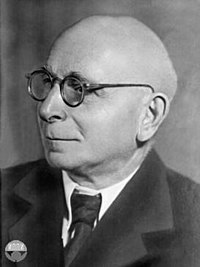Sergei Bernstein
Sergei Bernstein | |
|---|---|
 | |
| Born | Sergei Natanovich Bernstein 5 March 1880 |
| Died | 26 October 1968 (aged 88) |
| Nationality | Soviet |
| Alma mater | University of Paris |
| Known for | Bernstein's inequality in analysis Bernstein inequalities in probability theory Bernstein polynomial Bernstein's theorem (approximation theory) Bernstein's theorem on monotone functions Bernstein problem in mathematical genetics |
| Scientific career | |
| Fields | Mathematics |
| Institutions | University of Paris University of Göttingen University of Kharkiv Leningrad University Steklov Institute of Mathematics |
| Doctoral advisor | Charles Émile Picard David Hilbert |
| Doctoral students | Yakov Geronimus Sergey Stechkin |
Sergei Natanovich Bernstein (Russian: Серге́й Ната́нович Бернште́йн, sometimes Romanized as Bernshtein; 5 March 1880 – 26 October 1968) was a Soviet and Russian mathematician of Jewish origin known for contributions to partial differential equations, differential geometry, probability theory, and approximation theory.[1][2]
Work[]
Partial differential equations[]
In his doctoral dissertation, submitted in 1904 to Sorbonne, Bernstein solved Hilbert's nineteenth problem on the analytic solution of elliptic differential equations.[3] His later work was devoted to Dirichlet's boundary problem for non-linear equations of elliptic type, where, in particular, he introduced a priori estimates.
Probability theory[]
In 1917, Bernstein suggested the first axiomatic foundation of probability theory, based on the underlying algebraic structure.[4] It was later superseded by the measure-theoretic approach of Kolmogorov.
In the 1920s, he introduced a method for proving limit theorems for sums of dependent random variables.
Approximation theory[]
Through his application of Bernstein polynomials, he laid the foundations of constructive function theory, a field studying the connection between smoothness properties of a function and its approximations by polynomials.[5] In particular, he proved the Weierstrass approximation theorem[6][7] and Bernstein's theorem (approximation theory).
International Congress of Mathematicians[]
Bernstein was an invited speaker at the International Congress of Mathematicians (ICM) in Cambridge, England in 1928 and in Bologna in 1928 and a plenary speaker at the ICM in Zurich.[8] His plenary address Sur les liaisons entre quantités aléatoires was read by Bohuslav Hostinsky.[9]
Publications[]
- S. N. Bernstein, Collected Works (Russian):
- vol. 1, The Constructive Theory of Functions (1905–1930), translated: Atomic Energy Commission, Springfield, Va, 1958
- vol. 2, The Constructive Theory of Functions (1931–1953)
- vol. 3, Differential equations, calculus of variations and geometry (1903–1947)
- vol. 4, Theory of Probability. Mathematical statistics (1911–1946)
- S. N. Bernstein, The Theory of Probabilities (Russian), Moscow, Leningrad, 1946
See also[]
- A priori estimate
- Bernstein algebra
- Bernstein's inequality (mathematical analysis)
- Bernstein inequalities in probability theory
- Bernstein polynomial
- Bernstein's problem
- Bernstein's theorem (approximation theory)
- Bernstein's theorem on monotone functions
- Bernstein–von Mises theorem
- Stone–Weierstrass theorem
Notes[]
- ^ Youschkevitch, A. P. "BERNSTEIN, SERGEY NATANOVICH". Dictionary of Scientific Biography.
- ^ Lozinskii, S. M. (1983). "On the hundredth anniversary of the birth of S. N. Bernstein". Russ. Math. Surv. 38 (3): 163. Bibcode:1983RuMaS..38..163L. doi:10.1070/RM1983v038n03ABEH003497.
- ^ Akhiezer, N.I.; Petrovskii, I.G. (1961). "S. N. Bernshtein's contribution to the theory of partial differential equations". Russ. Math. Surv. 16 (2): 1–15. Bibcode:1961RuMaS..16....1A. doi:10.1070/RM1961v016n02ABEH004101.
- ^ Linnik, Ju. V. (1961). "The contribution of S. N. Bernšteĭn to the theory of probability". Russ. Math. Surv. 16 (2): 21–22. doi:10.1070/rm1961v016n02abeh004103. MR 0130818.
- ^ Videnskii, V. S. (1961). "Sergei Natanovich Bernshtein — founder of the constructive theory of functions". Russ. Math. Surv. 16 (2): 17. Bibcode:1961RuMaS..16...17V. doi:10.1070/RM1961v016n02ABEH004102.
- ^ S. Bernstein (1912–13) "Démonstration du théroème de Weierstrass, fondeé sur le calcul des probabilités, Commun. Soc. Math. Kharkow (2) 13: 1-2
- ^ Kenneth M. Lavasseur (1984) A Probabilistic Proof of the Weierstrass Theorem, American Mathematical Monthly 91(4): 249,50
- ^ "Bernstein, S." ICM Plenary and Invited Speakers, International Mathematical Union.
- ^ "1932 ICM - Zurich". MacTutor.
References[]
- O'Connor, John J.; Robertson, Edmund F., "Sergei Bernstein", MacTutor History of Mathematics archive, University of St Andrews
External links[]
- Sergei Bernstein at the Mathematics Genealogy Project
- Sergei Natanovich Bernstein and history of approximation theory from Technion — Israel Institute of Technology
- Author profile in the database zbMATH
- 1880 births
- 1968 deaths
- 19th-century Russian mathematicians
- 20th-century Russian mathematicians
- People from Kherson Governorate
- Corresponding Members of the Russian Academy of Sciences (1917–1925)
- Full Members of the USSR Academy of Sciences
- Moscow State University faculty
- National University of Kharkiv faculty
- University of Paris alumni
- Stalin Prize winners
- Recipients of the Order of Lenin
- Recipients of the Order of the Red Banner of Labour
- Approximation theorists
- Mathematical analysts
- Odessa Jews
- PDE theorists
- Probability theorists
- Scientists from Odessa
- Soviet mathematicians
- Burials at Novodevichy Cemetery
- Expatriates of the Russian Empire in France